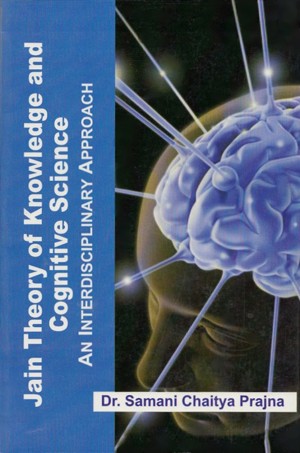In the field of philosophical investigation and Cognitive Psychology, knowledge of knowledge, knowledge about knowledge, knower of knowledge, process of knowledge and such other questions are eternal but never answered satisfactorily. Various theories have been speculated but no theory is found complete and self-satisfactory. Jain theory of knowledge is very ancient as well as of wide discipline. Jain epistemology deals with various aspects of knowledge, such as what is knowledge, What are the sources of knowledge, How knowledge is generated, What are the limitations of knowledge, Is knowledge self-illuminative or illuminated by something other, Does knowledge cognize the substance or itself, Can knowledge exist 'by birth or it is acquired later, Is extra-sensory perception possible, What are the ways of extra-sensory perception and so on.
Gardener in his book Mind's New Science, defines cognitive science as a contemporary, empirically based effort to answer long standing questions of epistemology more particularly those concerned with the nature of knowledge, its components, its sources, its development and its deployment.
Though Jain theory of knowledge is very ancient, it deals with the most of the problems of modern epistemology and information processing. Seeds of Jain epistemology are available in Jain canonical literature. We find the theory of knowledge in Agamic age, which later was developed as a theory of pramāṇa (instrument of valid cognition). The concept of pramāṇa in Jain philosophy is a later development. Originally, it is a theory of knowledge. Thus, finding them to be originally same, Jain theory of knowledge and pramāṇa is not differentiated in this work.
A comprehensive crossing over is possible between certain areas of Jain theory of knowledge and cognitive science and psychology. Cognitive science is rather very recently developed branch of study which studies mind and mental functions. It is an interdisciplinary study including many disciplines such as cognitive psychology, linguistics, neuroscience, artificial intelligence, cognitive anthropology, computer science and philosophy.
Jain theory of knowledge deals with many aspects of cognitive sciences deal with. The present work is an humble effort to study and present Jain theory of knowledge in the light of Cognitive science or rather sciences. As information processing is one of important aspects of cognitive science, the book basically deals with processing of various kinds of information, whether it is of sensory data or linguistic or extra sensory information. Thus, information processing in humans can be of three kinds:
- Processing of sensory or perceptual Information
- Processing of expression
- Processing of extra sensory information
In Jain theory of knowledge, processing of sensory or perceptual information is the function of mati jnana (perceptual knowledge) and the processing of expression is the function of Śruta jnana (verbal knowledge), whereas processing of extra sensory information is the function of pratyakṣa jnana (direct cognition) such as avadhi jnana (clairvoyance), manahparyava jnana (mind reading) and kevala jnana (omniscience).
Thus, after a brief introduction to Jain theory of knowledge, cognitive science and an interdisciplinary approach, the present work has been divided into two parts: The first part of which deals with processing of sensory or perceptual information and processing of expression whereas the second part purely deals processing of extra sensory information i.e. Extra Sensory Perception (ESP).
Since cognitive science is an interdisciplinary in nature, Jain theory of knowledge has also been dealt with various disciplines of cognitive science in the present study.
The first chapter is an introductory chapter which apart from giving a brief outline of Jain theory of knowledge and cognitive science, also depicts the interlinkages between nervous system and karmic functioning related to the cognitive functioning.
The second chapter deals with doors of perception and sensation, i.e. sense organs in detail. Along with the Neurobiology of sense organ, it also explains the classification, morphology, capacity and limitation of each sense organs as described in Jain scriptures.
The third chapter is exclusively dedicated to information processing. It presents a Jain model of information processing with the detailed explanation of each step of the model. It also compares each step of it with modern cognitive psychology and neuroscience.
The fourth chapter gives an outline of intelligence, artificial intelligence and Jain view of intelligence covering its various types with examples. It also paves a new path for the modern theory of intelligence and its assessment.
In the fifth chapter, the Jain philosophy of language as indicated in the second kind of cognition called śrutajñāna is explained in the light of Wittgenstein's philosophy of language. It deals with the problem of word-meaning in the context of dravya and bhava śruta and its role in determination of the meaning of the word.
The chapter six is an philosophical analysis of the concept of clairvoyance. It covers various types of clairvoyance and its relevance from the ancient to the present yogic systems.
The form of Extra Sensory Perception called mind-reading is very important from the para psychological point of view. It compares the theories of mind reading in cognitive psychology, mind reading through artificial intelligence such as brain scan and other machines and spiritual procedure of mind reading.
The last chapter before conclusion is the study of inter-relation between cognitive and emotional development. It proves an inter-linkage between emotional, spiritual and cognitive development through the Jain doctrine of guṇasthāna or stages of spiritual development. A deeper study of stages of spiritual development reveals that omniscience is not possible without spiritual development and spiritual development is not possible without emotional development.
Last but not the least, the conclusive chapter highlights the major findings of the study. It also illuminates those directions in which further research on the subject can be held.
The following inter-connections between cognitive science and Jain theory of knowledge can be viewed in the present book.
- Karmic functioning and nervous functioning
- Steps of information processing in Jainism and cognitive psychology
- Jain concept of verbal cognition and language philosophy
- Intelligence in Jainism and artificial intelligence
- Extra Sensory Perception and spiritual practices
- Mind reading in cognitive psychology, Science and Jain view of mind reading.
- Inter-relation of emotion, cognition and spiritual development.
Thus, as the name of the book, it covers almost all the spheres of cognitive science in the context of Jain theory of knowledge. I welcome the valuable suggestions of readers for further enlightenment of the subject.
 Samani Chaitya Pragya
Samani Chaitya Pragya

